Macquarie University NSW 2109
Enabling innovation
Our cutting-edge facilities provide students and researchers with the tools to help solve real-world problems, drive research, and encourage hands-on learning.
Our facilities include well-equipped laboratories, advanced equipment, specialised research centres and collaborative work areas. These resources help turn curious ideas into practical discoveries.
These facilities support innovative learning and groundbreaking research across:
- biology, chemistry and physics
- earth and environmental sciences
- information technology
- engineering
- medical sciences
- mathematics and statistics.
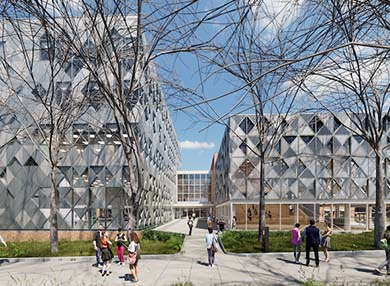 Engineering and Australian Astronomical Optics (AAO) Building
Engineering and Australian Astronomical Optics (AAO) Building
Macquarie University has recently committed over $150 million to the development of the Science and Engineering Precinct, centred around an advanced new building to be completed by August 2025.
This building will house the School of Engineering and AAO – Macquarie’s globally-recognised institution which designs and builds instrumentation and software for the world’s largest astronomical observatories and emerging space capabilities.
Within AAO’s new state-of-the-art hardware laboratories, workshops, and over-sized integration hall, researchers will design, develop and construct the tools to answer the Universe’s biggest questions.
The new precinct will also provide exceptional resources for students in our innovative courses, serve as a dynamic living lab for researchers, and house state-of-the-art facilities, including:
- the FORUM auditorium for stakeholder engagement
- mega-labs for student-centred project-based learning
- rapid prototyping facilities
- human-powered vehicle design and manufacturing
- MQ Robotics and drone facilities
- renewable and smart grid lab
- Future Communications lab
- MQ Orbital
- dedicated virtual reality spaces
- dedicated student presentation zones
- a fully equipped mechanical engineering workshop.
The co-location of AAO and the School of Engineering ensures our staff and students have access to
- world-class facilities
- authentic industry-led learning experiences
- seamless collaboration with engineering experts working on the frontiers of technology with international impact.
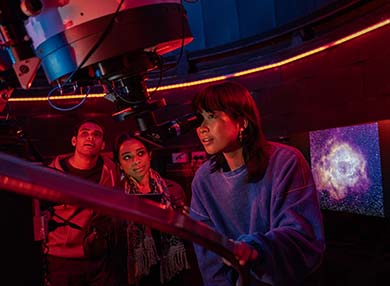 Macquarie Astronomical Observatory
Macquarie Astronomical Observatory
Macquarie University's on-campus observatory has a comprehensive collection of telescopes supporting a wide range of astronomical activities from research and education to public outreach, enabling observations of deep-sky objects, solar studies, and everything in between.
The observatory’s extensive array of telescopes include:
- a 24” CDK600 f/6.5 telescope with a fibre-feed to a spectrograph in the research lab for deep-sky viewing
- multiple Meade and Celestron models (16", 12", 10", 9.25", and 8")
- Dobsonian telescopes
- specialised imaging equipment such as:
- the TEC 140mm ED APO
- Explore Scientific telescopes.
The facility also features a Project PANOPTES setup and a 3.2-metre radio telescope operable remotely from the campus physics lab.
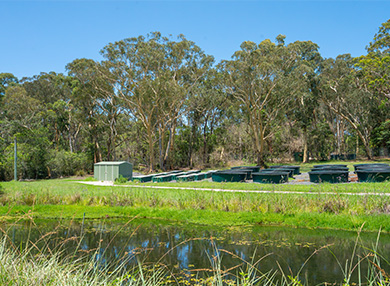 Fauna Park
Fauna Park
The Fauna Park’s natural bush setting within the Sydney metropolitan region enables us to integrate laboratory science with fieldwork mesocosms and agriculture.
Marine and freshwater systems are situated beside PC2 and biocontainment facilities managed by Applied BioSciences and by the School of Natural Sciences, with technical support from Macquarie Animal Research Services. The synergy of research into behaviour, biology, biosecurity, evolution and the environment is unique.
The 11-hectare Fauna Park, adjacent to an endangered Sydney Turpentine Ironbark Forest, features:
- climate-controlled animal housing
- semi-natural outdoor enclosures
- an artificial stream
- large ponds
- a seawater facility
- specialised enclosures for different species.
These facilities provide researchers and students with excellent resources for behavioural and ecological studies in both controlled and semi-natural environments.
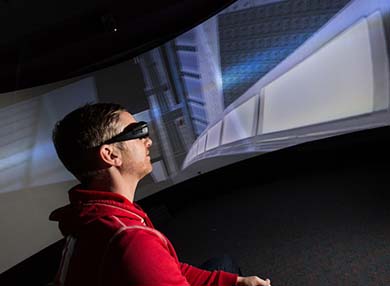 Games laboratories
Games laboratories
The School of Computing boasts two special-purpose labs for teaching and research in video game design and development.
The Games Teaching Lab includes 24 high-end gaming PCs with the latest graphics hardware, equipped with industry-standard game development software, including game engines and tools to support:
- 3D modelling and animation
- asset creation
- other software development processes.
The lab includes a dedicated virtual reality space with a fleet of VR headsets and gaming controllers for student game development projects, plus the latest video game consoles and a library of reference games for student research.
Here, the games team actively push the boundaries of game design, in a space set up for us to run experiments which explore how players respond to different kinds of games and VR experiences.
The lab is equipped with eight high-performance gaming PCs and the latest VR headsets, along with a variety of biometric monitoring equipment to record players':
- eye-gaze
- heart rate
- skin conductance
- brain activity.
With these tools, we can better understand how design decisions affect players’ behaviour and experience, informing the next generation of game makers and researchers. We encourage students to take part in games research projects in the lab, where they are exposed to advanced techniques they can apply when playtesting their own games.
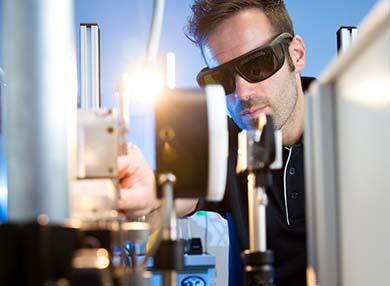 MQ Photonics
MQ Photonics
Macquarie University has a national and international profile for its research in lasers and photonics. MQ Photonics is a team of scientists and engineers from the School of Mathematical and Physical Sciences, School of Natural Sciences and School of Engineering, who do amazing things with light.
Our research areas span a wide variety of applications, including:
- high power lasers for dealing with space junk
- compact devices for optical communications and telescope instrumentation
- high precision imaging and targeting of cancer cells in the brain.
We teach photonics and related subjects in the Bachelor of Science Physics and Astronomy and Astrophysics majors. Working in more than 40 laser labs across campus, our Higher Degree Research students have won many awards for their research, and our researchers hold over 25 licensed patents. Many of our alumni have built successful careers in industry and government labs here in Sydney, and they continue to engage with Macquarie through supervision of internships and PACE projects.
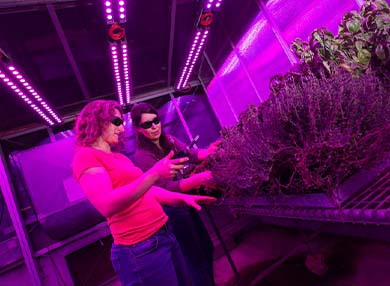 Plant Growth Facility (PGF)
Plant Growth Facility (PGF)
This modern and highly sophisticated facility provides a basis for research and teaching across plant, ecological and environmental sciences. The PGF is used in undergraduate and postgraduate teaching, and for experiments run by leading research groups including:
- academics
- Higher Degree Research students
- industry partners.
The PGF contains sixteen glasshouses fitted with a range of enhancements, including:
- full computerisation and remote monitoring and control
- supplementary blue and red spectrum LED lighting for photosynthesis
- tightly maintained temperature control
- sophisticated CO2 dosing and monitoring enabling climate change simulations.
Research at PGF spans a wide range of areas, including:
- climate change
- environmental sciences
- ecology
- genomics
- plant physiology
- proteomics.
Learn more about the Plant Growth Facility.
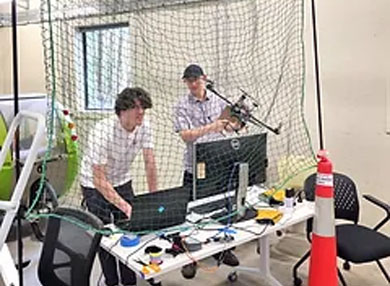 Macquarie Drone Lab
Macquarie Drone Lab
The Macquarie Drone Lab conducts pioneering research in advanced drone systems. Facilities include an indoor flight test warehouse and prototyping laboratory. Our interdisciplinary team spans computing, engineering, the sciences and more, and consists of:
- faculty members and staff
- postdoctoral researchers
- higher degree students
- undergraduates.
The MQ Drone Lab team is Australia’s top-ranked mobile computing research group, with a history of patented and award-winning work.
Our leading-edge research projects include such topics as:
- autonomous AI/ML-assisted navigation and landing of drones
- drone swarm lift
- mid-air battery swap for drones
- drone photonic systems
- security and privacy for drones.
Find out more about the Macquarie Drone Lab.
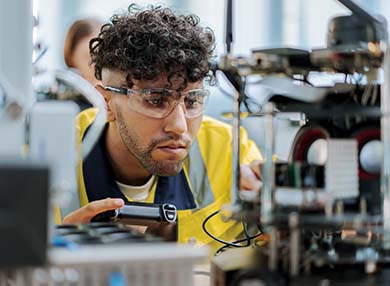 AI Centre and Data Science Lab
AI Centre and Data Science Lab
Macquarie University’s Artificial Intelligence (Al) Centre and Data Science Lab are at the forefront of cutting-edge research and innovation, shaping the future of technology and data-driven solutions.
The Al Centre focuses on pioneering advancements in machine learning, natural language processing and computer vision, providing students with hands-on experience in developing AI applications that address real-world challenges.
The Data Science Lab offers a vibrant and collaborative environment where students engage in transformative projects across various domains, from education to health and finance, leveraging big data analytics and predictive modelling.
Together, these labs offer unparalleled opportunities for students to immerse themselves in the dynamic fields of Al and data science, working alongside leading experts and gaining skills that are highly sought after in today's digital age.
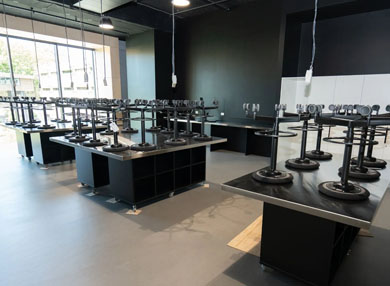 MAPS Maker Space (MMS)
MAPS Maker Space (MMS)
The new MMS is an open and inviting multidisciplinary space dedicated to four Cs:
- creativity
- curiosity
- culture
- collaboration.
MMS is a collaborative workspace near the undergraduate science teaching laboratories, open to staff, HDR students and senior undergraduates in MAPS, where everyone from beginners to experts can come together to turn their ideas into reality.
MMS is equipped with a wide range of tools and technologies, from 3D printers and laser cutters to hand tools and power tools, along with equipment for electronics, sewing and woodworking.
Outcomes include:
- enhancing student engagement and skill development
- enhancing research
- building an engaged and enthusiastic community of users to inspire and support others.
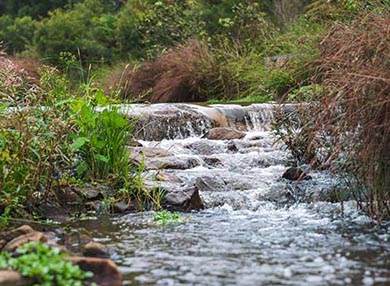 Award winning biodiverse campus
Award winning biodiverse campus
Macquarie University's Wallumattagal Campus is recognised as Australia's leading university for environmental sustainability, ranking 6th globally for campus biodiversity by Guardians of the Earth (GoE). Our grounds support a thriving ecosystem with more than 2,500 documented species across our 126-hectare site.
The campus serves as a living laboratory that integrates ecological conservation with Indigenous Dharug knowledge through several key features:
- The award-winning Mars Creek rehabilitation project, which has transformed campus waterways
- Habitat for more than 70 species of birds, reptiles, frogs and mammals, including eastern short-necked turtles and black swans
- Over 60,000 native plants and strategically designed riparian zones
- Natural spaces that support both research and teaching activities
This commitment to environmental stewardship has earned Macquarie University recognition in the Times Higher Education Impact Rankings 2024.
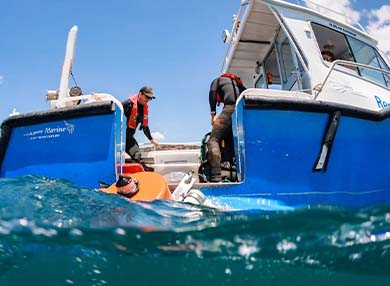 Sydney Institute of Marine Science (SIMS)
Sydney Institute of Marine Science (SIMS)
Macquarie University is one of four NSW-based universities partnering in the Sydney Institute of Marine Science, a collaborative research and training institute bringing together university researchers with state and federal marine and environmental agencies.
SIMS conducts multidisciplinary marine research on impacts of climate change and urbanisation, eco-engineering and habitat restoration, ocean resources and technologies, and outcomes of marine management approaches.
The SIMS research facility at Chowder Bay on Middle Head serves as a non-remote field station for marine science in Sydney Harbour.
Facilities include vessels and capability for launch and retrieval on site, five modern research laboratories, including a Marine Microbial Biotoxins Facility and a research aquarium with specialised systems for environmental control, 24/7 technical support, and on-site field accommodation.
Marine scientists at Macquarie University lead and participate in a range of significant projects including:
- Living Seawalls
- The Gamay Initiative
- Integrated Marine Observing System (IMOS)
- Sydney Harbour Research Program
- the World Harbour Project.